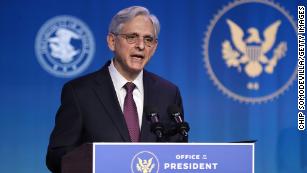By Jessica Schneider and Kelly Mena, CNN
Updated Sat February 20, 2021
VIDEO Source: CNN
Political issues hanging over Garland's confirmation hearing 02:48
(CNN)Judge Merrick Garland, President Joe Biden's nominee for attorney general, calls the January 6 attack on the US Capitol a "heinous attack" in his prepared opening statement to the Senate Judiciary Committee, which the Department of Justice released Saturday night ahead of his confirmation hearing on Monday.
"If confirmed, I will supervise the prosecution of white supremacists and others who stormed the Capitol on January 6 -- a heinous attack that sought to disrupt a cornerstone of our democracy: the peaceful transfer of power to a newly elected government," Garland says in the statement.
Attorney General nominee Merrick Garland to face challenges that include links to Biden and Trump
The attorney general nominee plans to stress that the role is meant to "serve the Rule of Law and to ensure equal justice under the law," noting that July 2020 marked the 150th anniversary of the Justice Department's founding in the aftermath of the Civil War and that its core mission was to secure the civil rights promised by the 13th, 14th and 15th Amendments.
"The mission remains urgent because we do not yet have equal justice," Garland plans to say. "Communities of color and other minorities still face discrimination in housing, education, employment, and the criminal justice system."
Barring any surprises at his hearing, he's poised to become Biden's first attorney general, bringing a longtime jurist with a steadying hand to a department that's teetering between crises. Garland has served in the Justice Department as an assistant US Attorney in Washington, DC, and if confirmed by the Senate will step away from 24 years on the bench.
He'll also explain why he is leaving a lifetime position as a federal judge.
"...(M)any of you have asked why I would agree to leave a lifetime appointment as a judge," Garland says in the statement. "I have told you that I love being a judge. I have also told you that this is an important time for me to step forward because of my deep respect for the Department of Justice and its critical role in ensuring the Rule of Law."
Though a confluence of factors drove Biden's selection of Garland last month, people familiar with the matter say it largely rested on Biden's belief that Garland can rise above politics in the post-Trump era.
"You won't work for me," Biden said when announcing Garland's nomination. "You are not the president's or the vice president's lawyer. Your loyalty is not to me. It's to the law, the Constitution."
For boosters of Garland, it was his reputation for fairness, honed over more than two decades on Washington, DC's, federal appeals court, that made him a good fit to lead the department out of the Trump era. His success in rebuilding the public's trust in the department, however, may hinge largely on his political deftness.

With Merrick Garland pick, Biden signals stark contrast with Trump on Justice Department
Former President Barack Obama had nominated Garland to the Supreme Court after a vacancy was created by the death of Justice Antonin Scalia in 2016, but his nomination was scuttled by Senate Republicans who held a majority in the chamber at the time.
When former President Donald Trump took office, Garland's nomination expired and he returned to his position as chief judge of the US Court of Appeals for the DC Circuit. He stepped down from the position as chief judge in February 2020, but still serves on the court. Former President Bill Clinton had appointed him to the court in 1997.
From the sprawling investigation into the January insurrection to sensitive probes of presidential allies, the caseload at the Justice Department is as controversial as ever, and Garland will be met by a workforce whose rejection of their previous boss's political maneuverings was unprecedented.
Over 200 former federal judges, US attorneys and leading Justice Department officials have signed letters of support for Garland, requesting urgency for the Senate to confirm him "as swiftly as possible."
Republicans, on the other hand, have already signaled they'll try to draw the judge out at his confirmation hearing on the hot-button federal investigations into New York's Democratic Gov. Andrew Cuomo, and the President's son, Hunter Biden, setting up the first opportunity for Garland to reveal how he'll handle his full plate of political problems.
Prior to his appointment as a US circuit judge, Garland served as principal associate deputy attorney general. He supervised the investigation of the 1995 Oklahoma City bombing, which killed more than 160 people and injured several hundred more. Garland also led the investigations of the 1996 Olympics bombing in Atlanta, in which two people died and more than 100 others were injured.
Additionally, the judge served as an assistant US attorney for the District of Columbia from 1989 to 1992, and as deputy assistant attorney general in the criminal division of the Justice Department from 1993 to 1994.
This story has been updated with additional details.
CNN's Paul LeBlanc, David Shortell, Katelyn Polantz, Joan Biskupic and Christina Carrega contributed to this report.
No comments:
Post a Comment